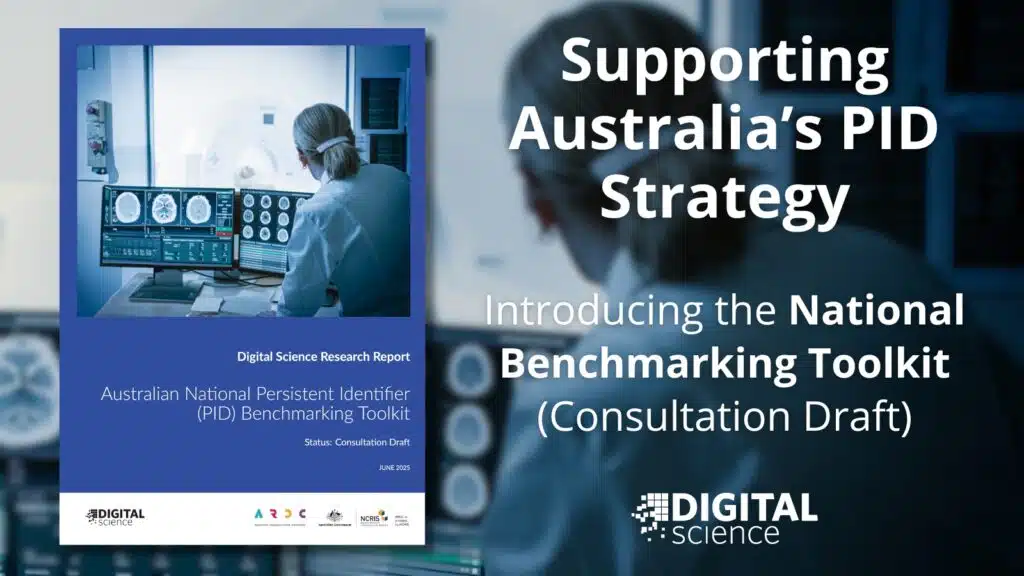Digital Science is pleased to support the Australian Research Data Commons (ARDC) in the development of the Australian National Persistent Identifier (PID) Benchmarking Toolkit, released today as a consultation draft.
Commissioned by ARDC as part of its work on the National Persistent Identifier Strategy, the toolkit provides a structured approach to assessing the adoption and maturity of PID infrastructure across Australia’s research ecosystem. It is intended to inform shared planning, highlight areas for improvement, and support long-term progress towards a more connected and interoperable research environment.

About the Toolkit
Persistent identifiers — including ORCID iDs, DOIs, RORs, and RAiDs — are now widely recognised as foundational components of modern research infrastructure. They help connect researchers, projects, outputs, institutions, and services across systems and domains.
The National PID Strategy outlines five strategic objectives that aim to increase the discoverability and reusability of research, improve reproducibility, reduce administrative burden, strengthen impact assessment, and support national capability mapping. The benchmarking toolkit aligns with these objectives by offering a set of SMART benchmarks — Specific, Measurable, Achievable, Relevant, and Time-bound —that provides a national framework for assessing progress against the Strategy whilst also providing a mechanism for institutions and sector bodies to evaluate their progress.
Each benchmark is grounded in the current state of practice and considers relevant factors such as international dependencies, expected maturity, stakeholder responsibilities, and alignment with FAIR principles (Findable, Accessible, Interoperable, and Reusable).
A Sector-Wide Resource
The toolkit covers a broad range of research inputs and outputs, including grants, research projects, research data, facilities, reports, methods, and non-traditional outputs. It also highlights the importance of connecting research activities across the full lifecycle.
As a practical demonstration of benchmarking in action, the report includes an analysis of Australia’s progress in ORCID adoption. Drawing on data from Dimensions and other sources, the report benchmarks ORCID uptake and record completeness by country, funder, discipline, publisher, and institution. Australia’s coordinated efforts over the past several years — including those led by ARDC and its partners — have resulted in one of the highest levels of ORCID adoption and integration globally.
Invitation to Contribute
This consultation draft is intended to support discussion and feedback across the sector. We invite contributions from institutions, funders, service providers, and researchers to help ensure that the final version — to be published in October 2025 — is both useful and implementable.
Over the coming months, Digital Science and ARDC will continue to refine the benchmarks and consult with stakeholders through a series of validation workshops and collaborative development activities.
Timeline
- July–August 2025: Consultation, Validation and refinement
- September 2025: Stakeholder workshops
- October 2025: Final release of the benchmarking toolkit
Access the Report
📄 Download the consultation draft of the Australian National PID Benchmarking Toolkit: https://doi.org/10.6084/m9.figshare.29281667
Co-authored by Digital Science’s Simon Porter (VP Research Futures), Dr Juergen Wastl (VP Research Evaluation and Global Challenges) and Dr Hélène Draux (Senior Data Scientist).
For questions or feedback, please contact Simon Porter.
The post Supporting Australia’s PID Strategy: Introducing the National Benchmarking Toolkit (Consultation Draft) appeared first on Digital Science.
from Digital Science https://ift.tt/A0uxcFQ


No comments:
Post a Comment